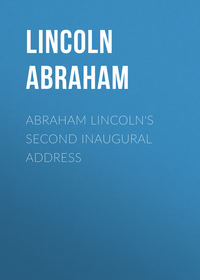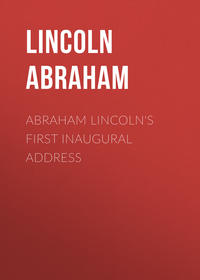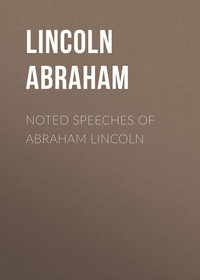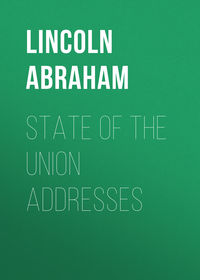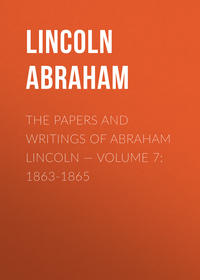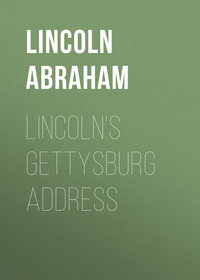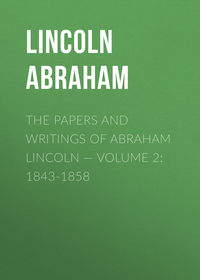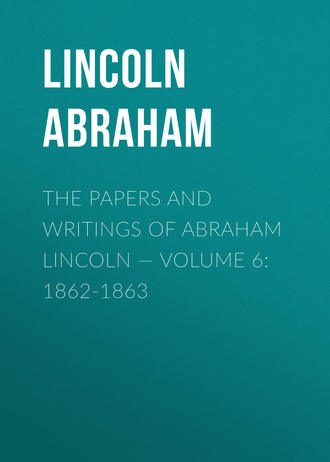 полная версия
полная версияThe Papers And Writings Of Abraham Lincoln — Volume 6: 1862-1863
A. LINCOLN
TELEGRAM TO H. H. SCOTT
EXECUTIVE MANSION, WASHINGTON, September 13, 1863Dr. WILLIAM H. H. SCOTT, Danville, Ill.:
Your niece, Mrs. Kate Sharp, can now have no difficulty in going to Knoxville, Tenn., as that place is within our military lines.
A. LINCOLN.
TELEGRAM TO J. G. BLAINE
WAR DEPARTMENT, WASHINGTON, D. C., September 25, 1863J. G. BLAINE, Augusta, Me.: Thanks both for the good news you send and for the sending of it.
A. LINCOLN.
PROCLAMATION SUSPENDING WRIT OF HABEAS CORPUS, SEPTEMBER 15, 1863
BY THE PRESIDENT OF THE UNITED STATES OF AMERICA:A Proclamation.
Whereas the Constitution of the United States has ordained that the privilege of the writ of habeas corpus shall not be suspended unless when, in cases of rebellion or invasion, the public safety may require it; and:
Whereas a rebellion was existing on the third day of March, 1863, which rebellion is still existing; and:
Whereas by a statute which was approved on that day it was enacted by the Senate and House of Representatives of the United States in Congress assembled that during the present insurrection the President of the United States, whenever in his judgment the public safety may require, is authorized to suspend the privilege of the writ of habeas corpus in any case throughout the United States or any part thereof; and:
Whereas, in the judgment of the President, the public safety does require that the privilege of the said writ shall new be suspended throughout the United States in the cases where, by the authority of the President of the United States, military, naval, and civil officers of the United States, or any of them, hold persons under their command or in their custody, either as prisoners of war, spies, or aiders or abettors of the enemy, or officers, soldiers, or seamen enrolled or drafted or mustered or enlisted in or belonging to the land or naval forces of the United States, or as deserters therefrom, or otherwise amenable to military law or the rules and articles of war or the rules or regulations prescribed for the military or naval services by authority of the President of the United States, or for resisting a draft, or for any other offense against the military or naval service.
Now, therefore, I, Abraham Lincoln, President of the United States, do hereby proclaim and make known to all whom it may concern that the privilege of the writ of habeas corpus is suspended throughout the United States in the several cases before mentioned, and that this suspension will continue throughout the duration of the said rebellion or until this proclamation shall, by a subsequent one to be issued by the President of the United States, be modified or revoked. And I do hereby require all magistrates, attorneys, and other civil officers within the United States and all officers and others in the military and naval services of the United States to take distinct notice of this suspension and to give it full effect, and all citizens of the United States to conduct and govern themselves accordingly and in conformity with the Constitution of the United States and the laws of Congress in such case made and provided.
In testimony whereof I have hereunto set my hand and caused the seal of the United States to be affixed, this fifteenth day of September, A.D. 1863, and of the independence of the United States of America the eighty-eighth.
A. LINCOLN.
By the President: WILLIAM H. SEWARD,
Secretary of State.
TO GENERAL H. W. HALLECK
EXECUTIVE MANSION, WASHINGTON, September 13, 1863MAJOR-GENERAL HALLECK:
If I did not misunderstand General Meade's last despatch, he posts you on facts as well as he can, and desires your views and those of the Government as to what he shall do. My opinion is that he should move upon Lee at once in manner of general attack, leaving to developments whether he will make it a real attack. I think this would develop Lee's real condition and purposes better than the cavalry alone can do. Of course my opinion is not to control you and General Meade.
Yours truly,
A. LINCOLN.
TELEGRAM TO MRS. SPEED
WASHINGTON, D.C., September 16, 1862MRS. J. F. SPEED, Louisville, Ky.:
Mr. Holman will not be jostled from his place with my knowledge and consent.
A. LINCOLN.
TELEGRAM TO GENERAL MEADE
EXECUTIVE MANSION, WASHINGTON, September 16, 1863MAJOR-GENERAL MEADE, Warrenton, Va.:
Is Albert Jones of Company K, Third Maryland Volunteers, to be shot on Friday next? If so please state to me the general features of the case.
A. LINCOLN.
TELEGRAM TO GENERAL SCHENCK
EXECUTIVE MANSION, WASHINGTON, September 17, 1863MAJOR-GENERAL SCHENCK, Baltimore, Md.:
Major Haynor left here several days ago under a promise to put down in writing, in detail, the facts in relation to the misconduct of the people on the eastern shore of Virginia. He has not returned. Please send him over.
A. LINCOLN.
TELEGRAM TO GENERAL MEADE
EXECUTIVE MANSION, WASHINGTON, September 17, 1863MAJOR-GENERAL MEADE, Headquarters Army of Potomac:
Yours in relation to Albert Jones is received. I am appealed to in behalf of Richard M. Abrams of Company A, Sixth New Jersey Volunteers, by Governor Parker, Attorney-General Frelinghuysen, Governor Newell, Hon. Mr. Middleton, M. C., of the district, and the marshal who arrested him. I am also appealed to in behalf of Joseph S. Smith, of Company A, Eleventh New Jersey Volunteers, by Governor Parker, Attorney-General Frelinghuysen, and Hon. Marcus C. Ward. Please state the circumstances of their cases to me.
A. LINCOLN.
REQUEST TO SUGGEST NAME FOR A BABY
TELEGRAM TO C. M. SMITHWASHINGTON, D. C., September 18, 1863.
C.M. SMITH, Esq., Springfield, Ill.:
Why not name him for the general you fancy most? This is my suggestion.
A. LINCOLN
TELEGRAM TO MRS. ARMSTRONG
WASHINGTON, September 18, 1863MRS. HANNAH ARMSTRONG, Petersburg, Ill.:
I have just ordered the discharge of your boy William, as you say, now at Louisville, Ky.
A. LINCOLN.
TO GOVERNOR JOHNSON
(Private.)EXECUTIVE MANSION, WASHINGTON, D. C., September 19.1863.
HON. ANDREW JOHNSON.
MY DEAR SIR: — Herewith I send you a paper, substantially the same as the one drawn up by yourself and mentioned in your despatch, but slightly changed in two particulars: First, yours was so drawn as that I authorized you to carry into effect the fourth section, etc., whereas I so modify it as to authorize you to so act as to require the United States to carry into effect that section.
Secondly, you had a clause committing me in some sort to the State constitution of Tennessee, which I feared might embarrass you in making a new constitution, if you desire; so I dropped that clause.
Yours very truly,
A. LINCOLN.
[Inclosure.]
EXECUTIVE MANSION, WASHINGTON, D. C.,
September 19, 1863.
HON. ANDREW JOHNSON, Military Governor of Tennessee:
In addition to the matters contained in the orders and instructions given you by the Secretary of War, you are hereby authorized to exercise such powers as may be necessary and proper to enable the loyal people of Tennessee to present such a republican form of State government as will entitle the State to the guaranty of the United States therefor, and to be protected under such State government by the United States against invasion and domestic violence, all according to the fourth Section of the fourth article of the Constitution of the United States.
A. LINCOLN
MILITARY STRATEGY
TO GENERAL H. W. HALLECKEXECUTIVE MANSION, WASHINGTON D.C. September 19, 1863.
MAJOR-GENERAL HALLECK:
By General Meade's despatch to you of yesterday it appears that he desires your views and those of the government as to whether he shall advance upon the enemy. I am not prepared to order, or even advise, an advance in this case, wherein I know so little of particulars, and wherein he, in the field, thinks the risk is so great and the promise of advantage so small.
And yet the case presents matter for very serious consideration in another aspect. These two armies confront each other across a small river, substantially midway between the two capitals, each defending its own capital, and menacing the other. General Meade estimates the enemy's infantry in front of him at not less than 40,000. Suppose we add fifty per cent. to this for cavalry, artillery, and extra-duty men stretching as far as Richmond, making the whole force of the enemy 60,000.
General Meade, as shown by the returns, has with him, and between him and Washington, of the same classes, of well men, over 90,000. Neither can bring the whole of his men into a battle; but each can bring as large a percentage in as the other. For a battle, then, General Meade has three men to General Lee's two. Yet, it having been determined that choosing ground and standing on the defensive gives so great advantage that the three cannot safely attack the two, the three are left simply standing on the defensive also.
If the enemy's 60,000 are sufficient to keep our 90,000 away from Richmond, why, by the same rule, may not 40,000 of ours keep their 60,000 away from Washington, leaving us 50,000 to put to some other use? Having practically come to the mere defensive, it seems to be no economy at all to employ twice as many men for that object as are needed. With no object, certainly, to mislead myself, I can perceive no fault in this statement, unless we admit we are not the equal of the enemy, man for man. I hope you will consider it.
To avoid misunderstanding, let me say that to attempt to fight the enemy slowly back into his entrenchments at Richmond, and then to capture him, is an idea I have been trying to repudiate for quite a year.
My judgment is so clear against it that I would scarcely allow the attempt to be made if the general in command should desire to make it. My last attempt upon Richmond was to get McClellan, when he was nearer there than the enemy was, to run in ahead of him. Since then I have constantly desired the Army of the Potomac to make Lee's army, and not Richmond, its objective point. If our army cannot fall upon the enemy and hurt him where he is, it is plain to me it can gain nothing by attempting to follow him over a succession of intrenched lines into a fortified city.
Yours truly,
A. LINCOLN.
TELEGRAM TO MRS. LINCOLN
WAR DEPARTMENT, WASHINGTON, D. C., September 20, 1863MRS. A. LINCOLN, New York:
I neither see nor hear anything of sickness here now, though there may be much without my knowing it. I wish you to stay or come just as is most agreeable to yourself.
A. LINCOLN.
TELEGRAM TO MRS. LINCOLN
WAR DEPARTMENT, WASHINGTON, D. C, September 21, 1863MRS. A. LINCOLN. Fifth Avenue Hotel. New York:
The air is so clear and cool and apparently healthy that I would be glad for you to come. Nothing very particular, but I would be glad to see you and Tad.
A. LINCOLN.
TO GENERAL H. W. HALLECK
EXECUTIVE MANSION WASHINGTON, D. C., September 21, 1863MAJOR-GENERAL HALLECK:
I think it very important for General Rosecrans to hold his position at or about Chattanooga, because if held from that place to Cleveland, both inclusive, it keeps all Tennessee clear of the enemy, and also breaks one of his most important railroad lines. To prevent these consequences is so vital to his cause that he cannot give up the effort to dislodge us from the position, thus bringing him to us and saving us the labor, expense, and hazard of going farther to find him, and also giving us the advantage of choosing our own ground and preparing it to fight him upon. The details must, of course, be left to General Rosecrans, while we must furnish him the means to the utmost of our ability. If you concur, I think he would better be informed that we are not pushing him beyond this position; and that, in fact, our judgment is rather against his going beyond it. If he can only maintain this position, without more, this rebellion can only eke out a short and feeble existence, as an animal sometimes may with a thorn in its vitals.
Yours truly,
A. LINCOLN.
TELEGRAM TO GENERAL A. E. BURNSIDE
EXECUTIVE MANSION, WASHINGTON, D.C., September 21, 1863GENERAL BURNSIDE, Greenville, Tenn.:
If you are to do any good to Rosecrans it will not do to waste time with Jonesboro. It is already too late to do the most good that might have been done, but I hope it will still do some good. Please do not lose a moment.
A. LINCOLN.
TELEGRAM TO GENERAL A. E. BURNSIDE
WAR DEPARTMENT, September 21, 1863. 11 A.MGENERAL BURNSIDE, Knoxville, Tenn.:
Go to Rosecrans with your force without a moment's delay.
A. LINCOLN,
TELEGRAM TO GENERAL W. S. ROSECRANS
WASHINGTON, September 21, 1863. 12.55 PMMAJOR-GENERAL ROSECRANS, Chattanooga:
Be of good cheer. We have unabated confidence in you, and in your soldiers and officers. In the main you must be the judge as to what is to be done. If I were to suggest, I would say, save your army by taking strong positions until Burnside joins you, when, I hope, you can turn the tide. I think you had better send a courier to Burnside to hurry him up. We cannot reach him by telegraph. We suppose some force is going to you from Corinth, but for want of communication we do not know how they are getting along. We shall do our utmost to assist you. Send us your present positions.
A. LINCOLN.
TELEGRAM TO GENERAL W. S. ROSECRANS
[Cipher.]WAR DEPARTMENT, September 22, 1863.8.30 A.M.
MAJOR-GENERAL ROSECRANS, Chattanooga, Tenn.:
We have not a word here as to the whereabouts or condition of your army up to a later hour than sunset, Sunday, the 20th. Your despatches to me of 9 A.M., and to General Halleck of 2 P. M., yesterday, tell us nothing later on those points. Please relieve my anxiety as to the position and condition of your army up to the latest moment.
A. LINCOLN.
TELEGRAM TO O. M. HATCH AND J. K. DUBOIS
EXECUTIVE MANSION, WASHINGTON. September 22, 1863HON. O. M. HATCH, HON. J. K. DUBOIS, Springfield, Ill.:
Your letter is just received. The particular form of my despatch was jocular, which I supposed you gentlemen knew me well enough to understand. General Allen is considered here as a very faithful and capable officer, and one who would be at least thought of for quartermaster-general if that office were vacant.
A. LINCOLN.
TELEGRAM TO MRS. LINCOLN
EXECUTIVE MANSION, WASHINGTON, September 22, 1863MRS. A. LINCOLN, Fifth Avenue House, New York: — Did you receive my despatch of yesterday? Mrs. Cuthbert did not correctly understand me. I directed her to tell you to use your own pleasure whether to stay or come, and I did not say it is sickly and that you should on no account come. So far as I see or know, it was never healthier, and I really wish to see you. Answer this on receipt.
A. LINCOLN.
TELEGRAM TO GENERAL W. S. ROSECRANS
WASHINGTON, September 23,1863. 9.13 A.MMAJOR-GENERAL ROSECRANS, Chattanooga, Tenn:
Below is Bragg's despatch as found in the Richmond papers. You see he does not claim so many prisoners or captured guns as you were inclined to concede. He also confesses to heavy loss. An exchanged general of ours leaving Richmond yesterday says two of Longstreet's divisions and his entire artillery and two of Pickett's brigades and Wise's legion have gone to Tennessee. He mentions no other.
"CHICAMAUGA RIVER, SEPTEMBER 20.
"GENERAL COOPER, Adjutant-General:
"After two days' hard fighting we have driven the enemy, after a desperate resistance, from several positions, and now hold the field; but he still confronts us. The loses are heavy on both sides, especially in our officers...
"BRAXTON BRAGG" A. LINCOLN
PROCLAMATION OPENING THE PORT OF ALEXANDRIA, VIRGINIA,
SEPTEMBER 24, 1863BY THE PRESIDENT OF THE UNITED STATES OF AMERICA:
A Proclamation.
Whereas, in my proclamation of the twenty-seventh of April, 1861, the ports of the States of Virginia and North Carolina were, for reasons therein set forth, placed under blockade; and whereas the port of Alexandria, Virginia, has since been blockaded, but as the blockade of said port may now be safely relaxed with advantage to the interests of commerce:
Now, therefore, be it known that I, Abraham Lincoln, President of the United Sates, pursuant to the authority in me vested by the fifth section of the act of Congress, approved on the 13th of July, 1861, entitled "An act further to provide for the collection of duties on imports, and for other purposes," do hereby declare that the blockade of the said port of Alexandria shall so far cease and determine, from and after this date, that commercial intercourse with said port, except as to persons, things, and information contraband of war, may from this date be carried on, subject to the laws of the United States, and to the limitations and in pursuance of the regulations which are prescribed by the Secretary of the Treasury in his order which is appended to my proclamation of the 12th of May, 1862.
In witness whereof, I have hereunto set my hand, and caused the seal of the United States to be affixed.
Done at the city of Washington, this twenty-fourth day of September in the year of our Lord one thousand eight hundred and sixty-three, and of the independence of the United States the eighty-eighth.
A. LINCOLN.
By the President WILLIAM H. SEWARD,
Secretary of State.
TELEGRAM TO GENERAL W. S. ROSECRANS
WAR DEPARTMENT, September 24, 1863. 10 A.MMAJOR-GENERAL ROSECRANS, Chattanooga, Term.:
Last night we received the rebel accounts, through Richmond papers, of your late battle. They give Major-General Hood as mortally wounded, and Brigadiers Preston Smith, Wofford, Walthall, Helm of Kentucky, and DesMer killed, and Major-Generals Preston, Cleburne, and Gregg, and Brigadier-Generals Benning, Adams, Burm, Brown, and John [B. H.] Helm wounded. By confusion the two Helms may be the same man, and Bunn and Brown may be the same man. With Burnside, Sherman, and from elsewhere we shall get to you from forty to sixty thousand additional men.
A. LINCOLN
MRS. LINCOLN'S REBEL BROTHER-IN-LAW KILLED
TELEGRAM TO MRS. LINCOLNWAR DEPARTMENT, SEPTEMBER 24, 1863
MRS. A. LINCOLN, Fifth Avenue Hotel, New York:
We now have a tolerably accurate summing up of the late battle between Rosecrans and Braag. The result is that we are worsted, if at all, only in the fact that we, after the main fighting was over, yielded the ground, thus leaving considerable of our artillery and wounded to fall into the enemy's hands., for which we got nothing in turn. We lost in general officers one killed and three or four wounded, all brigadiers, while, according to the rebel accounts which we have, they lost six killed and eight wounded: of the killed one major-general and five brigadiers including your brother-in-law, Helm; and of the wounded three major-generals and five brigadiers. This list may be reduced two in number by corrections of confusion in names. At 11.40 A.M. yesterday General Rosecrans telegraphed from Chattanooga: "We hold this point, and I cannot be dislodged except by very superior numbers and after a great battle." A despatch leaving there after night yesterday says, "No fight to-day."
A. LINCOLN.
TELEGRAM TO GENERAL McCALLUM
WAR DEPARTMENT, WASHINGTON, D. C., September 25, 1863GENERAL McCALLUM, Alexandria, Va.:
I have sent to General Meade, by telegraph, to suspend the execution of Daniel Sullivan of Company F, Thirteenth Massachusetts, which was to be to-day, but understanding there is an interruption on the line, may I beg you to send this to him by the quickest mode in your power?
A. LINCOLN.
TELEGRAM TO GENERAL MEADE
WAR DEPARTMENT, WASHINGTON, D. C., September 25, 1863MAJOR-GENERAL MEADE, Army of Potomac:
Owing to the press in behalf of Daniel Sullivan, Company E, Thirteenth Massachusetts, and the doubt; though small, which you express of his guilty intention, I have concluded to say let his execution be suspended till further order, and copy of record sent me.
A. LINCOLN.
TO GENERAL W. S. ROSECRANS
EXECUTIVE MANSION, WASHINGTON, September 25, 1863MY DEAR GENERAL ROSECRANS:
We are sending you two small corps, one under General Howard and one under General Slocum, and the whole under General Hooker.
Unfortunately the relations between Generals Hooker and Slocum are not such as to promise good, if their present relative positions remain. Therefore, let me beg — almost enjoin upon you — that on their reaching you, you will make a transposition by which General Slocum with his Corps, may pass from under the command of General Hooker, and General Hooker, in turn receive some other equal force. It is important for this to be done, though we could not well arrange it here. Please do it.
Yours very truly,
A. LINCOLN.
TELEGRAM TO GENERAL W. S. ROSECRANS
WAR DEPARTMENT, September 28, 1863. 8 A.MMAJOR-GENERAL ROSECRANS, Chattanooga., Tenn.:
You can perhaps communicate with General Burnside more rapidly by sending telegrams directly to him at Knoxville. Think of it. I send a like despatch to him.
A. LINCOLN.
TELEGRAM TO GENERAL SCHOFIELD
EXECUTIVE MANSION, WASHINGTON, D. C, September 30, 1863GENERAL SCHOFIELD, Saint Louis, Mo.:
Following despatch just received:
"Union Men Driven out of Missouri."
"Leavenworth, September 29, 1863.
"Governor Gamble having authorized Colonel Moss, of Liberty, Missouri, to arm the men in Platte and Clinton Counties, he has armed mostly the returned rebel soldiers and men wider bonds. Moss's men are now driving the Union men out of Missouri. Over one hundred families crossed the river to-day. Many of the wives of our Union soldiers have been compelled to leave. Four or five Union men have been murdered by Colonel Moss's men."


